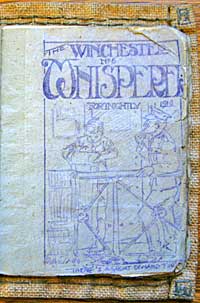|
Many protested against war in 1914. Some were socialists, who believed that the working men of the world should unite, not obey orders to kill each other. Some belonged to religious groups which forbade taking human life while some thought this particular war was wrong. Thousands of these varied protesters gathered in London's Trafalgar Square on August 2 to make their anti-war voices heard.
16-year old Harold Bing was also there. He had walked 11 miles from his home ‘It was thrilling,’ he said. Harold and his father were both pacifists (his father had opposed the Boer War), and they both joined the No-Conscription Fellowship. Harold helped to distribute NCF leaflets from house to house; on one occasion he was chased by a hostile householder wielding a heavy stick.
After conscription was introduced in 1916, Harold went before his tribunal. He was not thought to qualify for exemption. ‘18? - you're too young to have a conscience,’ said the chairman. But not too young to be sent to war. He was arrested but refused to regard himself as a soldier, or obey military orders and was court-martialled. The sentence: 6 months hard labour. In the end Harold spent nearly 3 years in prison.
Many COs were given what was called the ‘cat and mouse’ treatment: at the end of their sentences in civilian prisons, they were released, taken back to barracks, arrested again for disobeying orders, and imprisoned once more.
During his time in prison Harold helped to get vegetarian food provided  by the prison kitchen, and additional nourishment (a mug of cocoa) supplied for men who worked overtime. He also made friends with a few warders - helping the daughter of one of them with her maths homework. by the prison kitchen, and additional nourishment (a mug of cocoa) supplied for men who worked overtime. He also made friends with a few warders - helping the daughter of one of them with her maths homework.
Harold was also one of the men who with others created a prison magazine: written on thin brown sheets of toilet paper using the blunt end of a needle and the ink supplied for monthly letters home. Just the one copy was passed secretly from one prisoner to another. In Harold's prison this was called ‘The Winchester Whisperer’. The idea was widely copied in other prisons.
Harold Bing left prison with his sight damaged by years of stitching mailbags in dim light, but also having taught himself German and French. He wanted to teach, but many advertisements for teachers said ‘No CO need apply’. ‘And if you did apply, you got turned down as soon as they knew you were a pacifist.’ Eventually he found a sympathetic headmaster who was willing to employ him. As well as teaching, Harold worked as a peace campaigner and a member of the Peace Pledge Union until he died in 1975.
|

